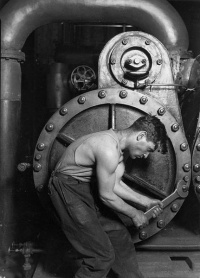Technology
From The Art and Popular Culture Encyclopedia
![The Canard Digérateur, or Digesting Duck, was an automaton in the form of duck, created by Jacques de Vaucanson in 1739. Voltaire wrote that "without [...] the duck of Vaucanson, you have nothing to remind you of the glory of France." ("Sans...le canard de Vaucanson vous n'auriez rien qui fit ressouvenir de la gloire de la France.") This is often misquoted as "Without the shitting duck, we would have nothing to remind us of the glory of France."](/images/thumb/200px-Duck_of_Vaucanson.jpg)
|
Related e |
|
Featured: |
The word technology refers to the making, modification, usage, and knowledge of tools, machines, techniques, crafts, systems, and methods of organization, in order to solve a problem, improve a preexisting solution to a problem, achieve a goal, handle an applied input/output relation or perform a specific function. It can also refer to the collection of such tools, including machinery, modifications, arrangements and procedures. Technologies significantly affect human as well as other animal species' ability to control and adapt to their natural environments. The term can either be applied generally or to specific areas: examples include construction technology, medical technology, and information technology.
The human species' use of technology began with the conversion of natural resources into simple tools. The prehistorical discovery of the ability to control fire increased the available sources of food and the invention of the wheel helped humans in travelling in and controlling their environment. Recent technological developments, including the printing press, the telephone, and the Internet, have lessened physical barriers to communication and allowed humans to interact freely on a global scale. However, not all technology has been used for peaceful purposes; the development of weapons of ever-increasing destructive power has progressed throughout history, from clubs to nuclear weapons.
Technology has affected society and its surroundings in a number of ways. In many societies, technology has helped develop more advanced economies (including today's global economy) and has allowed the rise of a leisure class. Many technological processes produce unwanted by-products, known as pollution, and deplete natural resources, to the detriment of the Earth and its environment. Various implementations of technology influence the values of a society and new technology often raises new ethical questions. Examples include the rise of the notion of efficiency in terms of human productivity, a term originally applied only to machines, and the challenge of traditional norms.
Philosophical debates have arisen over the present and future use of technology in society, with disagreements over whether technology improves the human condition or worsens it. Neo-Luddism, anarcho-primitivism, and similar movements criticise the pervasiveness of technology in the modern world, opining that it harms the environment and alienates people; proponents of ideologies such as transhumanism and techno-progressivism view continued technological progress as beneficial to society and the human condition. Indeed, until recently, it was believed that the development of technology was restricted only to human beings, but recent scientific studies indicate that other primates and certain dolphin communities have developed simple tools and learned to pass their knowledge to other generations.
Contents |
See also
- Greatest Engineering Achievements of the 20th Century
- Critique of technology
- History of science and technology
- Knowledge economy
- Law of the instrument - Golden hammer
- Lewis Mumford
- List of years in science
- New media
- Niche construction
- Science and technology in Argentina
- Technological convergence
- Technology and society
- Technology assessment
- Technology tree
- -logy
- Technological superpowers
Theories and concepts in technology
- Appropriate technology
- Diffusion of innovations
- Jacques Ellul
- Paradigm
- Philosophy of technology
- Posthumanism
- Precautionary principle
- Science and technology
- Strategy of Technology
- Instrumental conception of technology
- Techno-progressivism
- Technocentrism
- Technocracy
- Technocriticism
- Technological determinism
- Technological evolution
- Technological nationalism
- Technological revival
- Technological singularity
- Technology management
- Technology readiness level
- Technorealism
- Transhumanism
Economics of technology
Technology journalism


_-_Julien_Offray_de_La_Mettrie.jpg)

